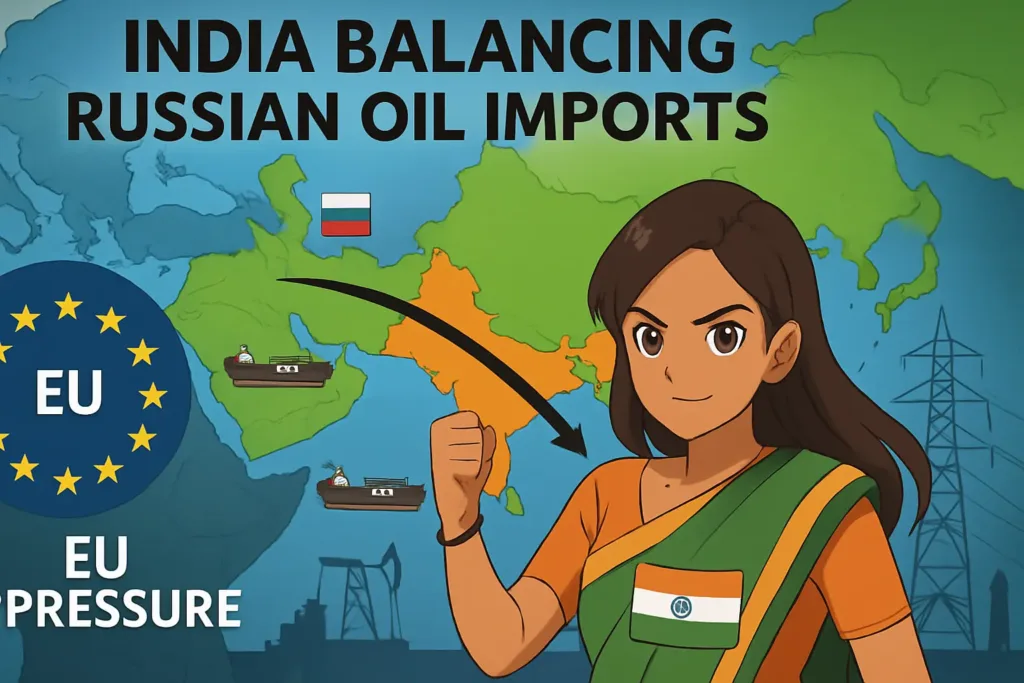
🇮🇳🛢️ India Reaffirms Commitment to Russian Oil amid EU Pressure
New Delhi, July 23, 2025 —
In the midst of intensifying global tensions following the Russia-Ukraine conflict, India has steadfastly defended its energy policy, especially its decision to continue oil imports from Russia. Despite persistent diplomatic pressure from the European Union (EU) and its Western allies, Indian leaders have reaffirmed their commitment to energy cooperation with Moscow, prioritizing national interests, economic stability, and strategic sovereignty.
🔍 Background: Why Russian Oil Matters to India
India, as the world’s third-largest oil importer and consumer, depends on imports for more than 85% of its oil demand. This huge reliance means any shock in the global oil market—particularly price spikes—can sharply impact inflation, fuel costs, and the overall economy.
When the Russia-Ukraine war broke out in 2022, the EU and US imposed sweeping sanctions on Moscow, sharply curtailing Western imports of Russian oil.
Russia then began offering steep discounts (as much as 20%–30% below global rates) to countries willing to buy crude outside Western channels.
India rapidly increased its Russian crude intake, saving billions of dollars in energy costs and keeping domestic fuel prices and its trade deficit manageable, even during periods of dramatic market turmoil.
🌐 EU Viewpoint: Diplomatic Pressure Mounts
For the EU, continued Russian oil sales mean ongoing funding for the war in Ukraine.
European leaders urge India to:
Align with Western sanctions or at least reduce energy imports from Russia.
Set a global example of isolating Moscow in response to aggression.
EU representatives argue that India’s ongoing purchases undermine the effectiveness of the broader sanctions regime and present “mixed signals” regarding international resolve on Ukraine.
However, India has consistently rejected this criticism, citing its sovereign right to act in the interests of its people.
🇮🇳 India’s Stand: “Energy First, Diplomacy Balanced”
What Indian Officials Say
“Energy security is not negotiable. We must prioritize the needs of our 1.4 billion citizens.”
– Petroleum Minister Hardeep Singh Puri
India’s key arguments:
⚡ Its vast and urgent energy needs cannot be compromised.
🕊️ India is not legally bound by EU or US sanctions, as it has not imposed its own regulations on Russian oil.
📈 Every state pursues its own best interests—and so does India.
🧪 Western countries themselves continue trading other Russian resources, such as fertilizers and metals.
🤝 India’s approach is pragmatic and interest-driven, not ideologically pro-Russia or anti-West.
Indian policymakers often highlight the West’s own sustained dealings with Russia well after the onset of Moscow’s aggressive policies, insisting that national interest and global market realities come before diplomatic posturing.
🔁 Russia-India Energy Ties: How the Trade Flows
Despite financial sanctions and hurdles, India and Russia have devised robust workarounds to keep trade channels open:
💴 Payments often occur in rupees, rubles, or UAE dirhams, minimizing reliance on the US dollar.
🚢 Non-Western shipping firms and insurers are used to transport oil, bypassing sanctions-related limitations.
🏭 Indian refiners—like Indian Oil Corporation (IOC), Hindustan Petroleum (HPCL), and Reliance Industries—work directly with Russian giants such as Rosneft.
⛽ By 2023, Russia emerged as India’s leading crude supplier, surpassing former frontrunners like Iraq and Saudi Arabia.
🌏 Broader Strategic & Diplomatic Outlook
India’s approach to the Russia-Ukraine crisis and Western pressure reflects its broader diplomatic philosophy:
⚖️ Advocating “strategic autonomy” and non-alignment, India aims to maintain balanced relations between major global powers.
🕊️ While calling for dialogue and a peaceful resolution in Ukraine, India chooses engagement, not isolation, with all critical players.
💡 India continues diversifying its energy mix yet defends the right to secure affordable resources wherever possible.
🗣️ Conclusion
India’s unwavering stand amid mounting international pressure illustrates a foreign policy focused—above all—on energy security, economic pragmatism, and the welfare of its citizens. While the EU and Western nations intensify diplomatic appeals, New Delhi signals that its priorities remain rooted in domestic needs and a balanced, multipolar approach to global affairs.
Key Takeaways:
🛢️ Russian oil remains critical for India’s economy and energy security.
🌐 EU pressure is significant but not decisive for Indian policy.
🇮🇳 India prioritizes national interest, strategic autonomy, and affordable energy for its people.
🤝 The India-Russia oil relationship is likely to endure as long as it serves Indian interests.


